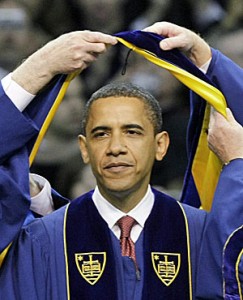 On May 17, President Barack Obama gave the commencement address and accepted an honorary doctorate at Notre Dame. Polls suggest that American Catholics were split down the middle about whether the university was right to invite—and, more importantly, bestow with an honorary degree—a president in favor of keeping abortion legal.
On May 17, President Barack Obama gave the commencement address and accepted an honorary doctorate at Notre Dame. Polls suggest that American Catholics were split down the middle about whether the university was right to invite—and, more importantly, bestow with an honorary degree—a president in favor of keeping abortion legal.
Former Catholic priest James Carroll, writing at TomDispatch, says that a lot more than abortion is at stake in the struggle for the soul of the Church. “Will Roman Catholicism,” he asks, “be swept into the rising tide of religious fundamentalism?” He also notes the relative silence of the Vatican—unsurprising, says Carroll, since “the highest Church authorities have long been accustomed to putting issues of theological purity second to the exigencies of state power.” This silence has been borne out by the official Vatican newspaper, L’Osservatore Romano, which has said nothing about Notre Dame, but has expressed cautious support in the past for Obama’s conciliatory efforts on ethical dilemmas like abortion.
On the ground, as the day approached, Notre Dame had become the stage for protest and counter-protest (pro-life ringleader Randall Terry actually said, “We will make this a circus”). Obama’s former opponent Alan Keyes was among the 22 protesters arrested on May 8. “Aborted fetuses” flew over South Bend. According to Kathleen Sprows Cummings, an American studies professor at Notre Dame, the ongoing protests stood in contrast to the high level of conversation that went on within the university, among its faculty and in the classroom:
We debated what the controversy revealed about faith and public life, dissent, episcopal authority, Catholic education, and electoral politics in the post-Vatican II American church. My students came to these discussions from a variety of ideological viewpoints, yet our conversations were invariably characterized by respect and by a sincere desire to understand what developments over the last half-century have brought us to this moment in American Catholicism.
In America, Michael Sean Winters accuses Obama of failing Catholic Theology 101:
For starters, there is nothing ironic about faith. Secondly, a Catholic university is an odd place to give an essentially Protestant interpretation of what can, and cannot, be “known” by faith. Finally, it is not doubt that invites humility. It is faith itself—faith in a God who has not finished with His creation, faith in a God who counseled us to humility in His scriptures and who gave an example of humility in His own life when He walked the earth—that leads us to humility.
Here at The Immanant Frame, however, Michele Dillon gives Obama credit for his “Catholic sensibility.” Her criteria were different from Winters’: “This he accomplished not by abstract talk about lofty principles but by the stories he told, two in particular.”
What effect, then, might this non-Catholic president have on the intra-Catholic debates? E.J. Dionne celebrates Obama’s contribution as a boon for “moderate and liberal forces” in the Church. First Things editor Joseph Bottum is dismayed at how Notre Dame fueled the fire by violating the American bishops’ 2004 “Catholics in Political Life” document, which stated that “Catholic institutions should not honor those who act in defiance of our fundamental moral principles.” A speech would have been fine; the honorary degree was unnecessary. Bottum fears that worse is to come.
There is concern that Obama’s speech, together with the upcoming confirmation battle over David Souter’s successor on the Supreme Court, will reignite the culture wars in the country at large—exactly what Obama, who first rose to prominence with a message of unity, probably hopes to avoid. John Mark Reynolds, a philosopher, faults Obama for not confronting the issues at play in the abortion debate more directly.
Amy Welborn agrees that Obama’s claim on dialogue is vacuous. She doubts whether Obama and his pro-choice allies will take any direct legal steps to reduce the number of abortions. While he claims to share common cause with conservatives in this regard, Welborn isn’t convinced—and, chances are, neither is most of America’s growing pro-life majority (according to numbers which Ed Kilgore disputes).
On the other end, the Center for Advancement of Public Policy’s Martha Burk calls Obama “weak on women’s rights“:
… if the president buys the idea that those who would outlaw abortion and send women back to the back alleys are not ideologues, and that they want to co-exist in civil disagreement, he’s naive at the very best. And he diminishes women in the bargain.
As is his custom, Obama sought to please everybody—and he did please many, including Sojourners’ Jim Wallis, who praised “this president’s willingness to confront controversy with an appeal to common values.” Tobin Grant notes that half of Americans aren’t even paying attention. Still, Obama’s effort to erect a new consensus often fails to convince the hardened culture warriors.













